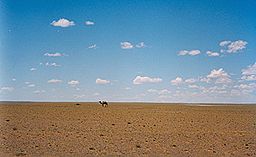- Air Homepage
- Environment in Asia
- Climate in China
Changing Climate in China: A rollercoaster ride
What affects the climate in China now? China is the world's second biggest country by population (India overtook China in recent years). This country is also aggressively pursuing rapid industrialization to boost its economic growth.
Search for more on world weather.
China's Climate Crisis: The Cost of Progress 💨Is the world's second biggest economy destroying its own environment with smog so thick it diverts rain and deserts covering a quarter of the country?
How is rapid industrialization melting Himalayan glaciers and why is China's billion-dollar green plans the only thing that can save its water and air...by diving into the real battle China is fighting against climate change.
Welcome to China's dynamic climate! China, the second-most populous nation in the world, is racing towards industrialization, which impacts its economy and environment.
While communism aims for eco-friendly resource allocation, it's often theoretical. Capitalism, on the other hand, promotes resource efficiency.
A surge in cars, urban smog, and changing weather patterns add to the problem. While China faces challenges, it's taking steps to go green.
The situation in China shows how much attention and care they need. With its growing influence in the global economy, it's an important trading partner for a lot of countries. Therefore, we need to understand China's actions and how they affect the global economy.
Despite being technically a Communist country, China has been 'open for business' since the mid '80s, and the Communist oligarchs have gone from capitalist to capitalist without much change. Chinese communism has always been about who holds the reins of power, not the power of the people.
In communist societies, pollution disasters (and lousy safety regulations) are sometimes hidden from the public eye because they're closed to the press (especially foreign press).
However, there are some potential benefits to communism from an ecological perspective:
- The government controls the means of production and can centralize decision-making in a communist system. As a result, the government can more easily coordinate efforts to reduce pollution and protect natural resources when planning and regulating environmental issues.
- A communist system allocates resources based on need, not profit. Environmental concerns can be given more weight in decision-making. It's better to use a scarce resource for essential goods and services rather than wasting it on non-essential, wasteful stuff.
- Community ownership: In a communist system, resources are owned by the community, not by individuals or corporations. As the community has a vested interest in protecting its own resources, this can help prevent environmental exploitation.
- Less consumption: Communist systems focus on providing basic needs for everyone rather than maximizing consumption. Overall resource use and environmental impact can be reduced this way.
Which System Protects Our Environment Better?
However, communism's ecological benefits are largely theoretical and haven't always been realized in practice. The communists have often pursued industrialization and economic growth at the expense of the environment, and centralized decision-making can also lead to environmental disasters.
On the other hand, the capitalist system encourages people to use their resources wisely so they can make more money. As a result, people don't waste resources, and in a capitalist system, businesses compete to make things more efficiently and cheaply. Their goal is to use fewer resources and help the environment.
Capitalism encourages companies make green products. To make the world cleaner and healthier, they try to make them use less energy or waste less. By buying products that are good for the planet, consumers can help protect the environment. Companies will make more of these products if enough people buy them.
It's changing in the east; Chernobyl was worse than most of the Soviet Union's reactor incidents, and was bad enough to get people's attention in Eastern Europe, but it wasn't the only one. (Western nuclear power plants have had a much better safety record.)
China's industrialization has impacted its micro- and macroclimates and air quality. As far as microclimates go, urban smog reminds me of the worst excesses of 1950s industrialism in the US and UK - where smoke and haze from coal-fired plants turned day into night and made most people wear masks. Long before the pandemic of 2020 to 2022.
Chinese climate has changed - the hot air from temperature inversions causes weather systems that could cause rain to divert around Beijing and other Chinese cities, worsening pollution.
The changes in China's climate are going to get worse as the country moves to more cars and auto exhaust (it has 40 million compared to 300 million in the States). Furthermore, most Chinese cities aren't built for functional and widespread automobile use, so motors will spend more time idling.
Weather and climate in China
There are two competing trends in China at the moment; There's always been steppe and desert on China's northwestern frontier. Now nearly 25% of China's land is desert, according to satellite photos.
The country's appetite for lumber has led to the loss of nearly three-fourths of its native forest cover. Changes in rainfall patterns have accelerated desert expansion, and China's push for more hydroelectric power has resulted in extensive flooding.
I'm sure they would love a rainy night there once in a while. Remember this song?
...and the Youtube channel homepage is at https://www.youtube.com/user/radiosonde1/featured
They're even changing the glacial patterns in the Himalayas, which feed all of China's major rivers, and ripple effects are causing cropland loss.
As part of a 600 billion dollar green stimulus package, China is planting more green belts around its cities, and building waste water treatment plants. Regulations in China require coal plants to meet emissions standards by 2012. “Is it enough, and is it soon enough?”
Navigate back from Climate in China to the China Air Pollution page now.
Search this site for more information now.
How is the climate in China changing?
What is known about the climate in China? Commerce and cars to start with. The changing air quality changes deserts and glaciers. Is that a good thing or a bad thing?
Do you have concerns about air pollution in your area??
Perhaps modelling air pollution will provide the answers to your question.
That is what I do on a full-time basis. Find out if it is necessary for your project.
Have your Say...
on the StuffintheAir facebook page
Other topics listed in these guides:
The Stuff-in-the-Air Site Map
And,
Thank you to my research and writing assistants, ChatGPT and WordTune, as well as Wombo and others for the images.
OpenAI's large-scale language generation model (and others provided by Google and Meta), helped generate this text. As soon as draft language is generated, the author reviews, edits, and revises it to their own liking and is responsible for the content.




New! Comments
Do you like what you see here? Please let us know in the box below.